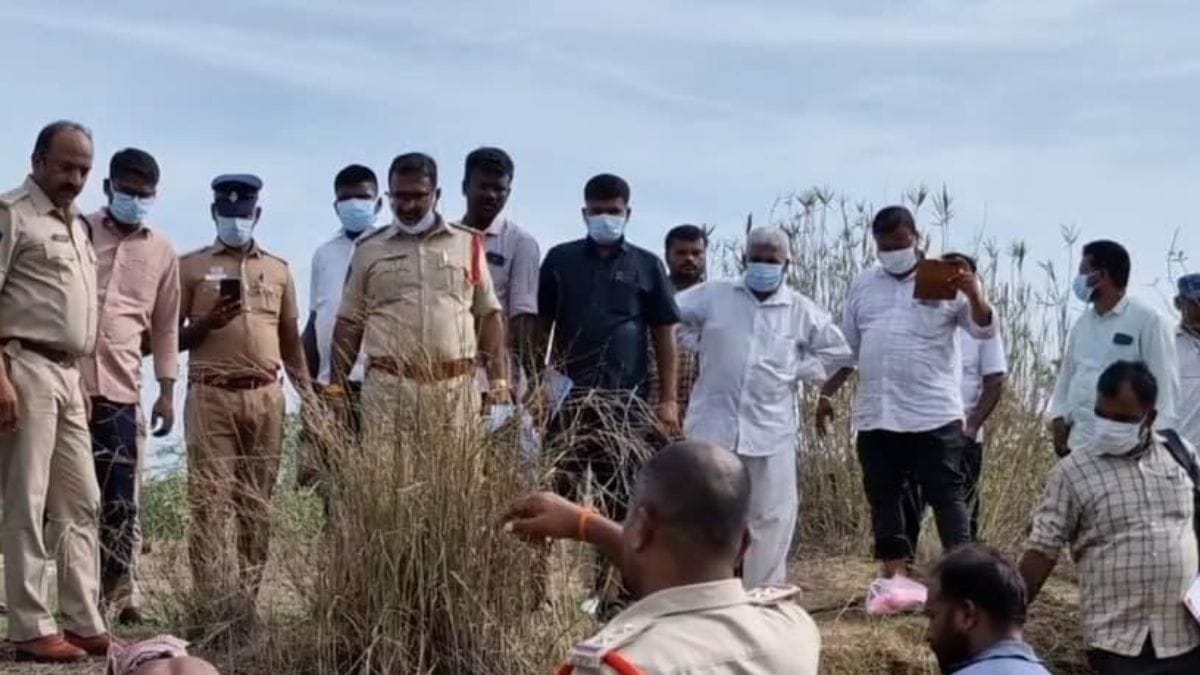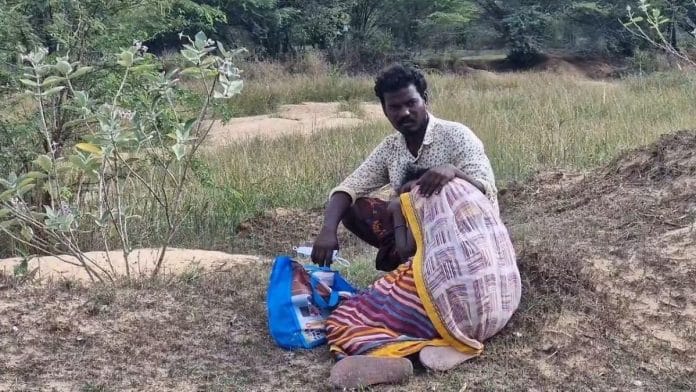New Delhi: “There was no sign of remorse on their faces. They were laughing and chit-chatting while I was sobbing, looking at my son’s body, imagining how much he must have cried and screamed. But no one showed him mercy,” said Anakamma, whose 9-year-old son’s body was found buried near the Palar River on 22 May in Tamil Nadu’s Kancheepuram district.
Venkatesh, a tribal boy from Chavatapalem village in Andhra Pradesh’s Tirupati district, was forced into bonded labour and made to rear ducks by a man named Muthu in the district’s Satyavedu village, after his mother, Anakamma, requested more time to repay a Rs 25,000 loan.
Police have arrested Muthu, his wife, and his son in connection with the case.
An FIR was lodged on 15 May—several days before the body was found—under multiple laws, including the SC/ST (Prevention of Atrocities) Act, 1989. It also invoked Sections 16 and 75 of the Bonded Labour System (Abolition) Act, 1976. Additionally, sections of The Child and Adolescent Labour (Prohibition and Regulation) Act, 1986; Juvenile Justice (Care and Protection of Children) Act, 2015; and Sections 146 read with 3(5) of the Bharatiya Nyaya Sanhita (BNS), which criminalise unlawful compulsory labour and wrongful confinement for 10 days or more. ThePrint has accessed the FIR.
Muthu claimed that Venkatesh had fallen ill with jaundice and was taken to a private hospital in Tamil Nadu on 11 April. This was corroborated by CCTV footage reviewed by the Satyavedu police. The boy allegedly died the next day, on 12 April, despite receiving treatment.
Venkatesh had been sent to work for Muthu’s son, who lives in Kancheepuram, Tamil Nadu.
The boy’s mother alleges that doctors who conducted the post-mortem told her he had been brutally assaulted.
“On 24 May, when I went to the hospital with Raniji (a local social worker helping the family), the doctor called us in and explained that my son had severe injuries—on his head, cheekbones and shoulders,” she told ThePrint over the phone.
“The doctor said they had stuffed a cloth in his mouth and pulled his head back, probably to stop him from screaming. These and other injuries pointed to a violent, targeted assault,” she added.
ThePrint reached Chengalpattu Government Hospital, where the post-mortem took place via email. This report will be updated if and when a response is received.
The post-mortem report—a copy of which ThePrint has seen—revealed that boy had sustained a blunt force injury to the head inflicted by a “heavy weapon”, and ante-mortem skull fractures.
“The boy was a little mischievous. So, at one point, to reprimand him, he was struck on the head,” a source said, adding that this blow led to internal hemorrhaging and ultimately resulted in the child’s death. This has been confirmed in the post mortem report, also accessed by ThePrint.
The police have filed murder charges in a supplementary memo, citing findings from the post-mortem report.
Anakamma and her family belong to the Yanadi tribe—one of the largest Scheduled Tribes in Andhra Pradesh, with a significant presence in the Nellore, Chittoor, and Prakasam districts. Traditionally hunter-gatherers, some subgroups like the Adavi Yanadi are known for their deep knowledge of forests, flora, and fauna. Over time, however, many Yanadis have become landless and now work as agricultural labourers, domestic helpers, or watchmen. Their marginalised status has left them especially vulnerable to exploitation, including bonded labour.
Also read: From Sitamarhi to Sadar Bazar, a mother’s fight to rescue 11-yr-old son from bonded labour
Debt and disappearance
In April 2024, Annakamma, her second husband, and their children began working for Muthu in Satyavedu. They were promised Rs 25,000 for their labour but received only Rs 15,000 as an advance. After three months, Annakamma had returned to her native village, Chavatapalem, to perform the last rites of her deceased ex-husband.
It was then that she learned her former husband had left behind a debt of Rs 25,000 owed to a man named Satish.
“Muthu came forward and paid the loan on his own, without my permission, and said that I owed him now. Until I repaid him, he would take my son. I had no choice. He even insisted on taking all my children but after I resisted, he only took my boy,” she said.
In the following months, Annakamma said she had only limited contact with Venkatesh. “He would sometimes call and tell me that the owner beat him with a stick,” she said.
When she asked Muthu to send her son back, he told her over the phone that she would have to pay Rs 42,000 for his release, Rs 17,000 more than the debt he had paid off.
After a few brief calls with Venkatesh, lasting just 3-4 minutes each, the last of which was on 9 April, the communication stopped. When she tried to ask Muthu about her son, he gave vague excuses, saying the boy had gone out for work, was in another place, or was unwell.
Worried, she eventually filed a complaint at the Tirupati police station. The case was later transferred to Satyavedu in the state’s Chittoor district.
With the help of local activists, she visited Muthu’s home. “When we reached there with a police constable, Muthu’s son said my boy had run away with a mobile phone and some money,” she said.
But the family claims Muthu and his relatives kept changing their statements. “First, they said he ran away. Then they said he was unwell. Then they didn’t know where he was,” she recounted.
Frustrated with the lack of progress, the family sought the help from local officials. With support from Advocate Parvataiah, a member of the District Vigilance Committee for the SC and ST (Prevention of Atrocities) Act, they met Gudur MLA Pasam Sunil Kumar, who intervened and spoke to the Tirupati police.
The police eventually located and detained Muthu.
He was first brought to the Kodur police station in Tirupati district and later transferred to Satyavedu. It was during questioning, the family claims, that Muthu finally admitted that Venkatesh had fallen ill with jaundice, died and had been buried.

When Venkatesh’s body was exhumed, a devastated Annakamma looked upon her son’s battered body, while Muthu and his family stood nearby, showing no sign of emotion, she claimed.
Now, left with just the memory of her son, Anakamma said, “My boy used to be very active. He could never sit quietly, always running around, playing.”
She recalled how fond he was of bicycles. “He would keep asking, ‘When will you get me a cycle? I want to ride it and show you’,” she said, adding that he would even play with discarded cycle tyres if he found any lying around.
Bonded labour & vulnerable Yanadi tribal community
Bonded labour was outlawed in India in 1976 and the government has pledged to identify, release, and rehabilitate approximately 1.84 crore bonded labourers by 2030.
According to data presented by the Union government in the Lok Sabha, a total of 3,15,302 people were released from bonded labour between 1978 and January 2023. Of these, 94 percent have been rehabilitated.
Meanwhile, National Crime Records Bureau (NCRB) data shows that 1,155 cases were registered under the Bonded Labour System (Abolition) Act, 1976, in 2019—96 percent of them involving crimes against SCs and STs.
In 2020, 1,231 such cases were registered (94 percent against SC/ST), and in 2021, the number dropped to 592, with 96 percent still involving SC/ST victims.
Shaik Basheer, Executive Secretary of the Association for Rural Development, an NGO based in Andhra Pradesh’s Nellore that has been supporting people affected by issues like bonded labour for over a decade, described the Yanadi as “the most vulnerable” and among the most marginalised communities in the region.
Speaking to ThePrint, Basheer said the death of a child due to forced labour reflects the broader structural vulnerabilities faced by such communities.
“Most of them don’t even have basic documents like Aadhaar cards. They don’t have proper homes or access to drinking water. Their minimum entitlements are denied,” he said.
According to the 2011 Census, the Yanadi tribe has a population of 5,33,746 individuals.
Basheer, also a member of the District Vigilance Committee on Bonded Labour, established by the state government, said that when families face emergencies such as health issues or sudden financial crises, they often accept small advances from employers as a stopgap.
“In return for the advance, their children or family members go and work. But the advance is never really repaid. It becomes a trap,” he said.
Describing the pattern of bonded labour, he added, “these families are given just enough to eat, while being forced to work. That’s how the cycle continues.”
He claimed that since 2012, 428 people from the Yanadi community have been rescued from bonded labour.
Basheer also pointed out that while rescue operations do take place, “the biggest challenge over the past six years has been rehabilitation and prosecution”.
“Cases are filed, but follow-up is poor and often forgotten,” he said, calling it a systemic failure.
He stressed the urgent need for a detailed socio-economic and demographic survey of the community.
“There should be family-level mapping at the village level,” he suggested, noting that most of them are engaged in distress migration and subsistence activities like begging, manual scavenging and rag-picking.
“The government must identify how many children are in these households, their age, their entitlements, and whether schemes are reaching them or not,” Basheer said.
He also proposed the formation of a high-level monitoring committee and the appointment of deputy directors at the district level to oversee tribal welfare exclusively. He recommended the provision of basic documents like Aadhaar cards, ration cards, job cards, health cards, voter IDs, and bank accounts, and the inclusion of Yanadi women in self-help groups to strengthen livelihoods.
What the govt has done
The Andhra Pradesh government initiated a significant development scheme for the Yanadi tribal community in 2002. This initiative led to the establishment of a dedicated Integrated Tribal Development Agency (ITDA) for the Yanadis, headquartered in Nellore.
The ITDA was created to address the unique challenges faced by the Yanadi community, particularly those residing in the districts of Nellore, Chittoor, Prakasam and YSR Kadapa.
While acknowledging that the government has introduced some positive measures, such as residential schools under the ITDA in the Nellore basin, Basheer noted that the ITDA currently covers six districts and needs better decentralisation.
“There should be dedicated district-level officers and funds earmarked specifically for the Yanadi community,” added Basheer, who also served as a board member of the Central Advisory Board for Child Labour and Adolescent Labour in 2016-18.
(Edited by Sugita Katyal)






